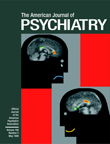Low Levels of Transthyretin in the CSF of Depressed Patients
Abstract
OBJECTIVE: Transthyretin plays an important role in the transport and distribution of thyroid hormone in the central nervous system (CNS). This study replicated and extended to patients with nonrefractory depressive illness a pilot study indicating that patients with refractory major depression have significantly lower levels of CSF transthyretin than do healthy comparison subjects. METHOD: Lumbar punctures were performed in drug-free subjects with DSM-III-R major depression (N=18), DSM-III-R bipolar disorder, depressed phase (N=1), and healthy comparison subjects (N=24). CSF concentrations of transthyretin, determined by a quantitative dot-immunobinding assay, of the depressed patients and comparison subjects were compared by analysis of covariance (ANCOVA). The relationship between CSF transthyretin levels and Hamilton Depression Rating Scale scores was determined in a subset of the depressed patients. RESULTS: CSF concentrations of transthyretin were significantly lower in the depressed patients than in the comparison subjects by ANCOVA. Within the depressed group there was no significant overall correlation between CSF transthyretin levels and Hamilton depression scale scores, but there was a significant inverse correlation in male depressed patients (N=8) between CSF transthyretin concentrations and Hamilton depression scores. CONCLUSIONS: Lower CSF transthyretin concentrations in depressed patients may reflect either a stable trait in this population or a state change secondary to depression or other factors. Lower CSF transthyretin concentrations may result in altered CNS thyroid hormone homeostasis. Such alteration could account for certain mood and neurovegetative symptoms of depression and might contribute to failure of standard antidepressant treatment.



